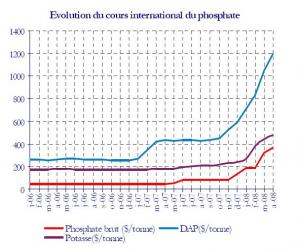Morocco seeks bigger phosphate profits

Now they plan building a first phosphate processing plant inside occupied Western Sahara.
Published 16 April 2009
Ever since Morocco occupied Western Sahara in violation of an International Court of Justice opinion, following UN condemnations, an increasing flow of phosphate rock has been exported from the territory.
This exports have consisted of unprocessed phosphate rock, and the volume last year reached probably close to 4 million tonnes.
Now, the Moroccan state phosphate company OCP seem to wish stopping the exports of the raw materials, and instead process the phosphate themselves - inside the occupied territories.
This is revealed in L'Économiste, a major business newspaper in Morocco. L'Économiste published in its edition of 06 April 2009 a dossier about phosphates based on a long interview with the CEO of the OCP, Mostafa Terrab.
In this way, OCP will increase the profits from the plundering of Western Sahara. The phosphate exports from Western Sahara is in violation of international law, as the industry does not comply with the wishes and interests of the people of the territory. See a UN opinion on the mineral exploitation in Western Sahara here.
Importing the controversial phosphates also constitutes a strong and unfortunate political support for the illegal occupation, on the part of countries such as the US, Australia, New Zealand and Spain.
OCP adapts to price plunge
Western Sahara Resource Watch last summer wrote about the phosphate prices which in 2008 reached an all time high, increasing almost eight-fold.
 The red line shows the development of phosphate rock prices until mid 2008, while the blue line shows the price development of processed phosphates (DAP - diammonium-phosphates). Processed phosphates simply pay out more.
The red line shows the development of phosphate rock prices until mid 2008, while the blue line shows the price development of processed phosphates (DAP - diammonium-phosphates). Processed phosphates simply pay out more.Since then, the global phosphate prices have again plunged.
According to the l'Économiste interview, the 2009 price fall is due to a decreased market, and it would be "a fundamental injustice" to compare the exceptional 2008 prices with the 2009. OCP is said to have already anticipated the price fall.
"The year 2008 is not a year of reference for the phosphates. It was an exceptional year, which occurs every 30 years. The last time was in 1973", precised Mr. Terrab.
According to the l'Economiste interview, OCP has voluntarily decreased its exports. They plan to increase the total production capacity in Morocco and Western Sahara from a today's level of 30 million tonnes, to 45 million tonnes annually in 2015.
The illegal exports from occupied Western Sahara reached an all-time-high in 2008, constituting around 13 percent of the total Moroccan exports.
See the story here (in French): L'Économiste, 6 April 2009, page 1, page 2, page 3.
News
Australia finally finished phosphate imports
The last remaining importer of phosphate rock from occupied Western Sahara in Australia has announced that it will no longer purchase the conflict mineral.
08 July 2025
Japanese conflict mineral importer identified
WSRW has traced the imports of phosphate rock to a dock just adjacent to a subsidiary of Japanese company Taiheiyo Cement Corporation.
16 June 2025
These are the clients of Morocco’s phosphate plunder
For the eleventh year in a row, Western Sahara Resource Watch publishes a detailed, annual overview of the companies involved in the purchase of conflict phosphates from occupied Western Sahara.
22 May 2024
COWI abandons future projects in Western Sahara
After undertaking work for the Moroccan state phosphate company in Western Sahara, the Danish consultancy giant COWI states that it “will not engage in further projects" in the occupied territory.
11 March 2024



